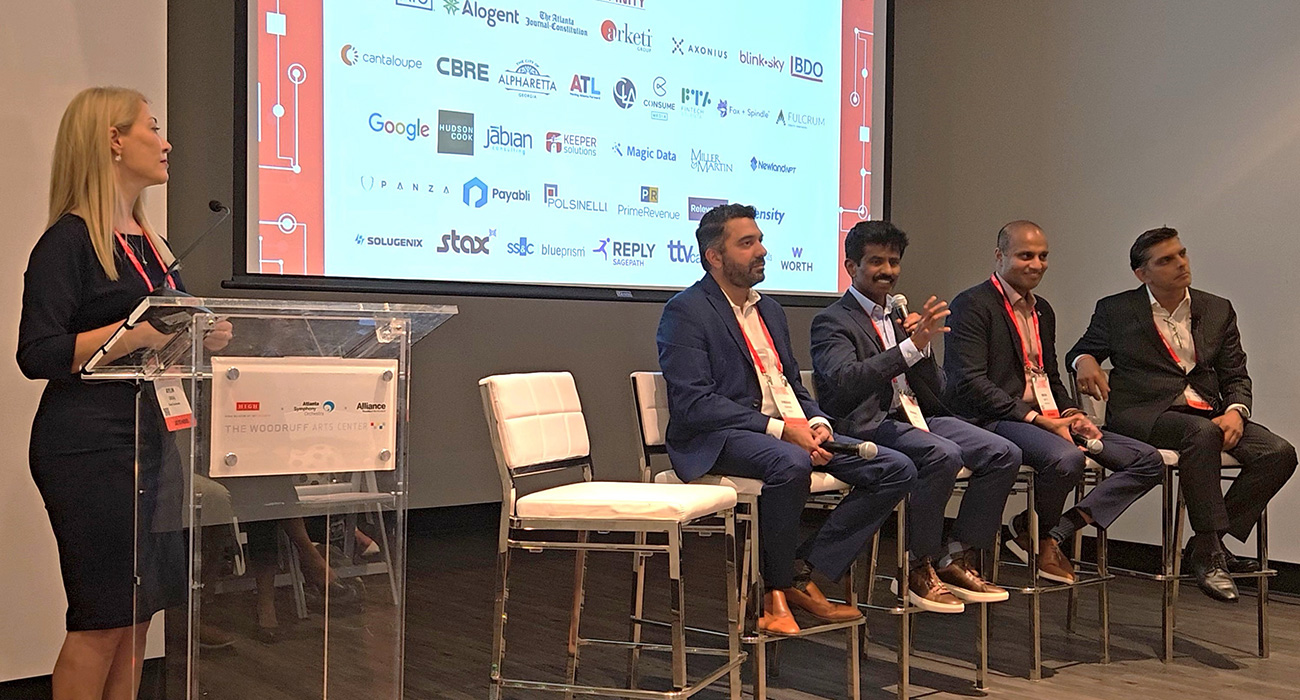AI in Fintech: The Truth About What’s Working and What’s Not
AI promises to transform fintech, but most implementations fail. Learn what’s actually working, straight from industry leaders.
We went to Fintech South 2025 with a clear message: Agentic AI is reimagining engineering itself, and it’s transforming fintech in the process.
Our CEO, Dominic Savio, brought this perspective to a panel called Applications and Implications of AI in Fintech, alongside fellow tech leaders.
Instead of the usual AI hype, the conversation focused on what’s actually working and what isn’t.
Here’s what we learned.
Key Takeaways from the Session
1. AI Realities in Fintech
- AI won’t drastically reduce total cost of ownership.
- AI will, however, improve go-to-market speed and boost developer productivity.
- It’s not plug-and-play: most solutions aren’t ready-made or instantly effective.
- AI will not replace programmers anytime soon.

“What we’re hearing is AI is ready-made, it’s off the shelf, it’s plug and play. That’s not true — especially if there is no data pipeline in place. And when you do hear amazing success stories, remember: every organization is unique. Your processes won’t be the same as another’s, so we all need to be patient and observe when it comes to AI solutions.”
2. The Big Problem: AI That Can’t Be Explained
In fintech’s regulated environment, explainability isn’t optional. If you can’t explain how a model arrived at a decision, you risk losing both customer trust and regulatory approval.
The risks are real:
- Bias, hallucinations, and unpredictable outputs threaten system integrity.
- Without proper governance, AI amplifies existing flaws rather than fixing them.
- Inconsistent outputs make compliance impossible.
Given these risks, many banks are starting with internal AI agents — where risk is lower and oversight is easier. Customer-facing applications will follow once explainability and repeatability are solved.

“We’re all used to a world of 0s and 1s. Now everything is probability-based, meaning output isn’t repeatable. But fintech is a regulated industry where we need to explain every decision. That’s why the next wave is explainable AI. When we can explain our decisions, the game changes completely. Until then, we don’t want AI for decision-making — it’s only for augmentation. A force multiplier.”
3. Real Use Cases Are Emerging — Especially Internally
Fintech leaders are seeing traction with AI in internal operations, where risk is lower and ROI is easier to measure. Some lower-risk, customer-facing applications are beginning to emerge as well.
Internal Operations:
- Real-time anomaly detection
- Automated dispute handling and chargeback resolution
- PO-to-invoice matching and claim data extraction
Low-Risk Customer-Facing Use Cases:
- AI-enhanced onboarding and IVR-based payments
- Embedded finance with AI-driven personalization
- Conversational agents for customer service and engagement
4. Data Is the Foundation — and the Risk
AI’s success in fintech starts with data quality. Without it, even the best models fail.
The problem: Poor data creates amplified errors. AI won’t fix bad governance — if you give AI the wrong context, it will only magnify the flaws already there.
The solution:
- Build robust data pipelines before implementing AI.
- Identify, label, and catalog your data systematically.
- Reimagine governance frameworks to be AI-compatible.
This structured approach enables effective model training and RAG (Retrieval-Augmented Generation) implementations.

“One thing has not changed: garbage in, garbage out. Data management is the key to being effective in the AI world. You need to create a data pipeline. How? Identify the nature and structure of your data — structured, unstructured, semi-structured, real-time — then label it, then catalog it. Then you can decide: do you use this data to train your model, or do you use it for RAG?“
5. Legacy Infrastructure Isn’t a Barrier — If You’re Strategic
You don’t need to rip out legacy systems before adopting AI. Phased integration allows AI and existing infrastructure to coexist and evolve together.
The approach: Start small with low-risk use cases, connect systems through APIs and middleware, and test rigorously at each stage. Legacy systems contain valuable business logic and data, so treat them as assets AI can enhance, not barriers to overcome. Success comes from strategic implementation and disciplined validation, not having the newest technology.
6. Measuring ROI Requires a New Lens
Traditional metrics still matter, but they don’t tell the full story. What we heard from the panel:
- Focus on how AI enables people to do more.
- Use multiple engineering metrics together — not in isolation.
- Use “dark launches” to validate performance before customer exposure, gathering real data on efficiency gains and process improvement.
The Bottom Line
So, how do you actually engineer fintech solutions that work in the age of Agentic AI?
Don’t chase every new trend. Get your data foundation right first. Take a phased approach. Start with low-risk internal use cases, then expand outward.
What Relevantz Can Do for You
GenAI and Agentic AI are reshaping financial services by automating internal workflows, streamlining onboarding, and enhancing customer engagement.
At Relevantz, we build custom fintech solutions powered by GenAI platforms. Our expertise ensures smooth integration and real business impact.
Ready to elevate your fintech operations with AI? Contact us to see how Relevantz can help.

